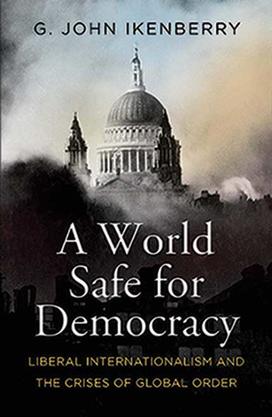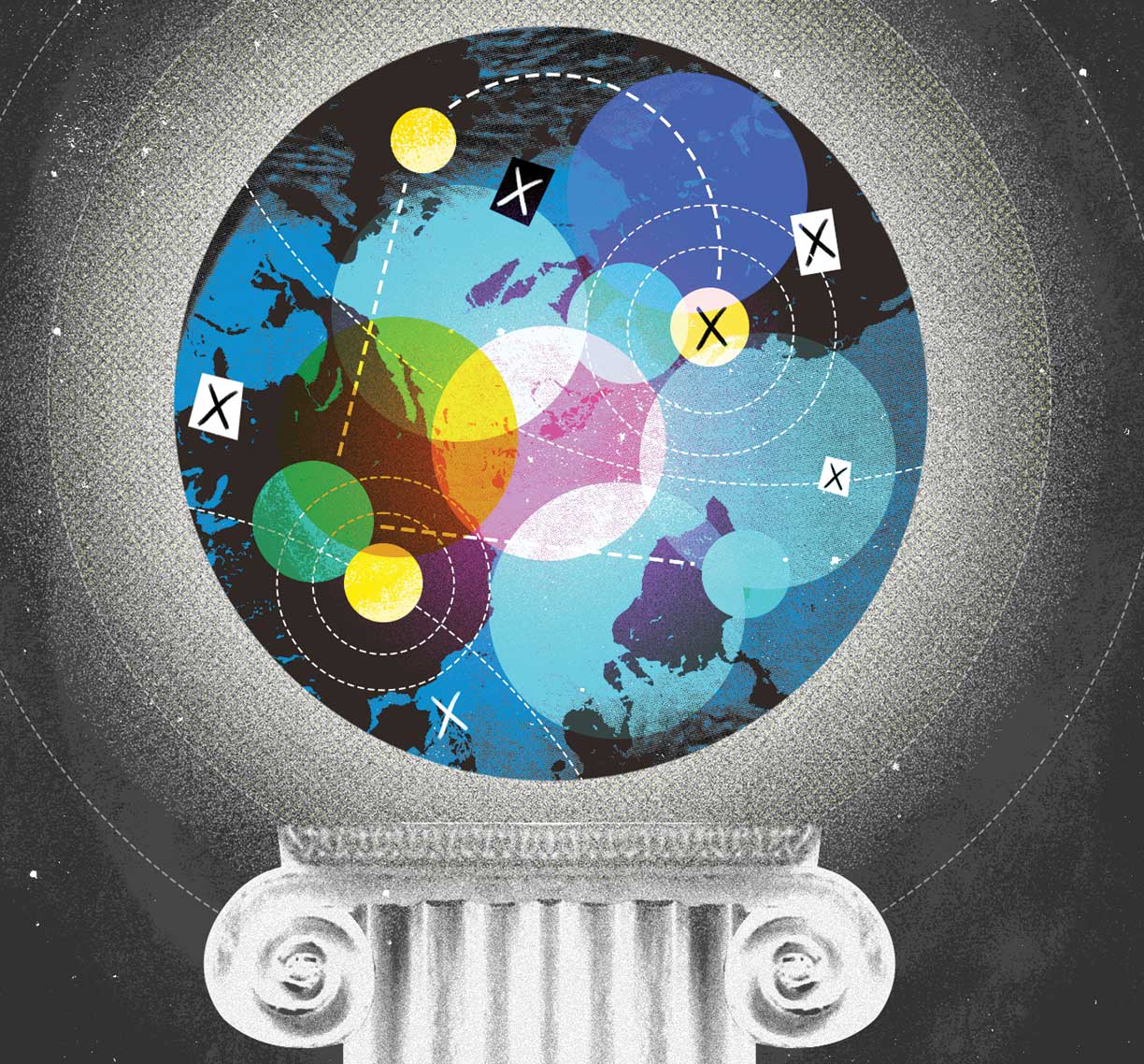Faculty Book: G. John Ikenberry on Bolstering Democracy
G. John Ikenberry, the Albert G. Milbank Professor of Politics and International Affairs and a Global Scholar at South Korea’s Kyung Hee University, wants to update President Woodrow Wilson 1879’s project of making the world “safe for democracy.” He argues for an international order at once less idealistic and more socially progressive than Wilson’s, involving “a pragmatic, reform-oriented approach” to issues such as trade, national security, climate, and public health. Ikenberry outlines his vision in A World Safe for Democracy: Liberal Internationalism and the Crises of Global Order (Yale University Press). PAW talked to him about the book and its implications for American foreign policy.

What do you mean by liberal internationalism?
Liberal internationalism is a tradition or school of thought that’s emerged with the rise of liberal democracies over the last 250 years, a set of ideas and projects that reflect the efforts of liberal democracies to build international order. It sits alongside other great traditions, such as political realism and Marxism. The phrase most associated with it is Woodrow Wilson’s famous phrase “to make the world safe for democracy,” used in a speech on the eve of America’s entry into World War I. I’m trying to recast what that might mean. Rather than see it as a kind of idealistic crusade to spread democracy, it can be seen as a project of making liberal democracies safe by creating an international environment in which they can survive and prosper and organize themselves in progressive ways.
What’s the relationship between liberal internationalism and modernity?
Realists are interested in how competing states cope with the problems of anarchy. Liberal internationalists are more focused on the problems of modernity, building frameworks of cooperation so that states can manage the problems generated by science, technology, and industrialism. Modernity offers great promise through technologies that make our lives better and connect us in new ways. But there are also perils that make us more vulnerable: global warming, health pandemics, proliferation of weapons of mass destruction, biomedical or bioengineering that can potentially unleash pathogens into the international system. If we’re to survive, [we need] to find new ways to cooperate.
Why this book now?
I wrote the book, in part, to speak to today’s unquiet. Looking back over the last two centuries, you realize that liberal democracy has been troubled before — that the period after the Cold War, when it looked like liberal democracy was the only game in town, that history had spoken, is more an anomaly. The longer 200-year period [involves] a lot of contestation, near-misses — in the 1930s, what might even be called an extinction moment when liberal democracy really had to struggle with finding a basis for survival. We can speak to today’s problems by showing the various ways in which liberal democracies have navigated these sorts of storms in the past.
How has liberal internationalism evolved since Wilson?
In some sense, Wilson was more of a 19th-century figure. The true transformative moment occurred in the 1930s and ’40s under the auspices of Franklin Roosevelt. There was this effort to reinvent an international order and create frameworks to stabilize liberal democracy itself, to reconceive how these countries would operate among themselves and find cooperative solutions. That generation saw the collapse of the world economy, the rise of fascism and totalitarianism, the total war that was World War II, the Holocaust, and the dropping of the atomic bomb. That was an extraordinary moment in which leaders of liberal democracies had to think about how to rebuild and secure the foundations for open societies. That was the pivotal period in the modern reinvention of liberal internationalism.
What are some of the limitations of liberal internationalism?
Politically, as a project, it’s quite thin – it’s like a flag without an army. Because of that, it’s found itself aligned with other movements — nationalism, imperialism, capitalism, Great Power politics, and Anglo-American hegemony. It has this kind of shape-shifting property. There’s no question that those who have acted on liberal internationalist ideas have often been quite complex figures. Liberal internationalism has been entangled in many of the most shameful aspects of the modern era, and the book tries to be honest about the failings and the moral blindness – and also render a fair judgment that it’s also, in various moments and ways, been on the right side of history.
So, liberal internationalism allows states to cooperate within the framework of rules and institutions but doesn’t dictate that every country be a liberal democracy with a socially progressive agenda.
Right. It really begins with a vision of how the liberal democracies can create a world that will make their societies safe. And it does that with the conviction that open exchange and trade are mutually beneficial, that international institutions can facilitate cooperation, that liberal democracies have special reasons and capacities to cooperate. Finally, in an era of growing economic, security, and environmental interdependence, cooperation is increasingly important for these societies to achieve their ends and protect their values. That’s the core of liberal internationalism.
What is the progressive or, as you call it, “left revisionist” critique?
It would be a critique that that, like liberal democracies, which are riven with inequality and injustices, liberal internationalism has failed to fully achieve the kind of international order that that would truly reflect our vision of social justice.
Why do you think nationalistic tendencies have gained such ascendancy?
I would argue that the rise of nationalist, populist, authoritarian, anti-democratic, illiberal forces inside the liberal democratic world may be more profound than those forces that are attacking it from the outside. It goes to a kind of breakdown in the post-war bargains and coalitions and class compromises and political settlements that were part of the decades of liberal democratic and economic and trade growth across this world.
In some sense, the liberal international order is a victim of its own success. After the Cold War ended, the liberal democratic world expanded. The golden era of Western liberal democratic order was when it was inside the Cold War bipolar system. It had a kind of club characteristic, [like] a mutual-aid society. But to be inside was to buy into a suite of responsibilities and obligations that created a sense of coherence and sustained cooperation. When the Cold War ended, that inside order spread and became the outside order. So, the liberal international order became more like a shopping mall where countries could wander in — countries could join the World Trade Organization but not buy into the human-rights regime.
What are some of the challenges facing the Biden administration?
I think the administration is eager to try to rebuild a kind of working international order that is rooted in cooperation among like-minded countries. The administration has, for example, proposed that there be a summit of democracies that would provide an opportunity to focus on their problems and on possibilities of cooperation. There is a pretty keen awareness in the new administration that things have unraveled, and the U.S. is not going to be a credible, effective leader unless it puts its own house in order and returns to the vision of a cooperatively organized multilateral system organized around pragmatic problem-solving in areas from trade to environment to public health to security cooperation.
There are challenges, too, from players like Russia and China.
The best way to respond to the challenges from Russia and China is to focus on rebuilding and reinventing open societies.
It seems as though the world may be hungering for American leadership, as long as it’s not too heavy-handed.
I think the United States has been a hugely successful actor on the world stage when it has had a kind of enlightened view of its interest — that is, that America can do well and do good at the same time. Liberal internationalism should not be seen as a campaign to promote globalization. It should be seen as a project for managing our interdependence.
What are the specific problems that the pandemic has raised for the world order?
The COVID crisis has both illuminated and accelerated the crisis of liberal international order. It’s certainly brought out what might be called pandemic nationalism, but it’s also shown the world the cost of failed international cooperation. It showed us the virtues of competent government. It showed us the fragility of democratic institutions. It showed us the precariousness of Enlightenment-era civilization, and it showed us the inescapable fact of humans’ common fate. And so, while the immediate news is not good, in a deeper sense it illuminated why the current international order is not adequate or acceptable, and that we need to reimagine what is possible — because this has been a stark reminder of what happens when we aren’t working together.
Interview conducted and condensed by Julia M. Klein












No responses yet